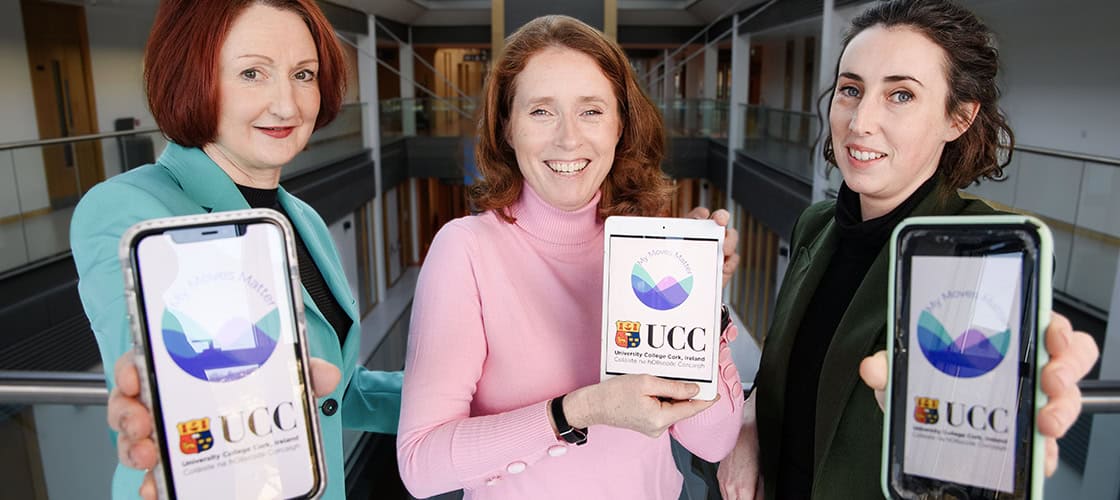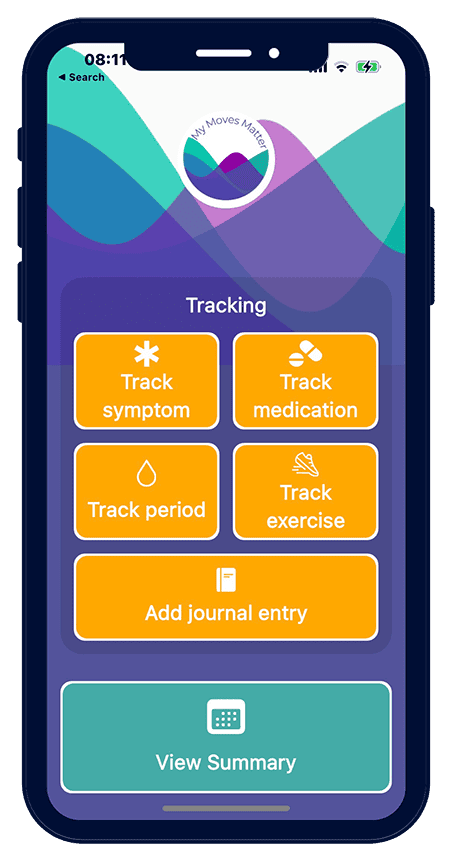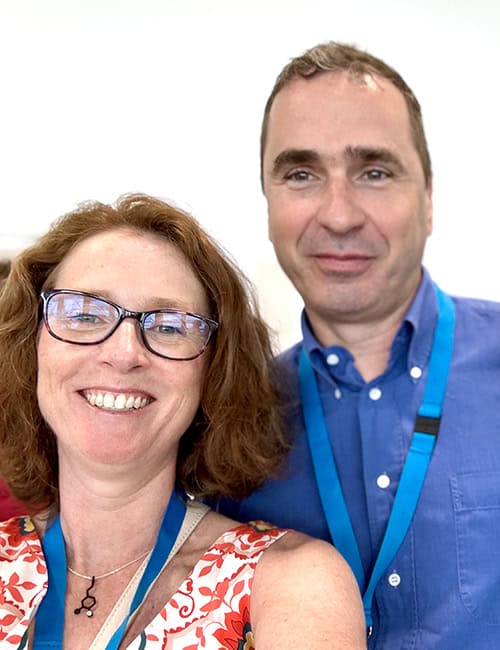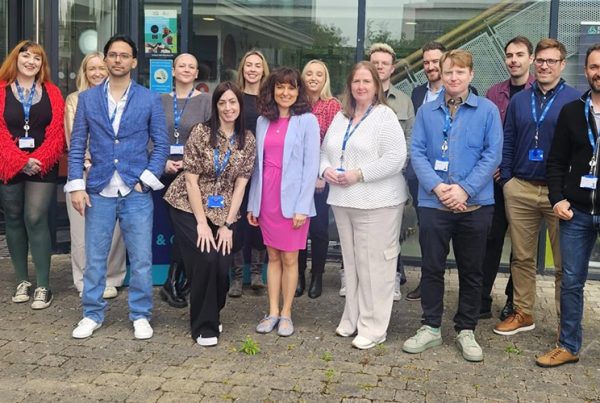

Did you know that neurological care costs European countries more than cancer, diabetes, and heart disease care combined? Neurological diseases are also the biggest cause of disability worldwide. Parkinson’s Disease (PD) is the fastest-growing neurological condition in the world (an estimated 11.8 million people are living with the disease today).
Although traditionally thought of as an “old man’s illness”, 40% of people living with Parkinson’s are women, up to 30% of whom are under the age of 60. Another disturbing fact about Parkinson’s is that, by the time you are diagnosed, you have probably already lost 60% to 70% of your dopamine-producing neurons.
Richelle Flanagan is the co-founder of My Moves Matter, a startup on a mission “to empower people with neurological conditions to live their best lives”. A dietician for the past 20 years, Richelle has become a passionate advocate for Parkinson’s Disease care, better brain health, medical research, and patient and female empowerment.
We interviewed Richelle about her inspiring work and vision for the future of neurological care.
Originally working in sales and marketing, Richelle first became interested in nutrition when her sister was diagnosed with cancer. She completed a Masters in Human Nutrition and Dietetics at University of Ulster, Coleraine, and has worked as a registered dietitian ever since. She was also the president and first CEO of her professional body, the Irish Nutrition and Dietetic Institute (INDI). In the past, she was a board member of the Coeliac Society of Ireland (CSI) and chair of their Clinical Advisory Board.
Richelle first detected symptoms associated with Parkinson’s while pregnant with her second child. Writing notes for a follow-up consultation with a client, she noticed that her handwriting was much smaller than it had been previously, and she couldn’t make it any larger. Micrographia, as it is known, was one of a few physical clues that eventually led to a diagnosis of Young Onset Parkinson’s Disease (YOPD) after her child was born.
- Richelle Flanagan
- Richelle Flanagan with Co-founder & CTO Rene Reinbacher
“I hid my diagnosis for the first couple of years because of the stigma around brain diseases. But then I thought about how I had advocated for my patients and around diseases such as Coeliac (which I have) and I decided it was time to start meeting other people with Parkinson’s. I attended the World Parkinson’s Congress and started doing more research into the disease. I realised there was very little study into the connection with diet or of women with Parkinson’s. I applied to be an ambassador at the next world congress, which was in Barcelona last year.”
Richelle co-founded the Women’s Parkinson’s Project, a platform for raising awareness and getting better treatments and research for women with PD. One of the actions they took was to put together a survey asking women about the impact of hormones on their symptoms – something Richelle had noticed in herself and heard her counterparts mention. 80% of respondents found their symptoms worsened before their menstrual bleed, 50% found they worsened during, and a few found they were worse afterwards. The survey also revealed that symptoms became more erratic during perimenopause. 40% of respondents said their symptoms were worse during perimenopause.
Richelle co-authored a research paper entitled Unmet Needs of Women Living with Parkinson’s Disease: Gaps and Controversies, which concluded that there needed to be a way for women’s experiences of PD to be validated. She was subsequently invited by Maria Teresa Ferretti, CTO of the non-profit organisation Women’s Brain Project, to take part in a two-week Hackathon in Switzerland, with the goal being to develop an app that would track women’s PD symptoms across their menstrual cycle.
“It was all remote because of the pandemic, but it was really exciting to get that initial prototype together. I actually met my co-founder and CTO, Rene Reinbacher, during the Hackathon. He has a data science background and could really see the potential for technology to bring great benefits to people living with the challenges of PD. We went on to win the Hackathon, which is when I discovered that there was also prize of 5,000 CHF [roughly €5,100]. Incredibly, the organisers decided to triple the prize money because they wanted to see the project realised. That’s when I decided to go to the Local Enterprise Office and ask them for support. They were able to match the prize money from the Hackathon with Feasibility Funding.
“Because I had previously completed Phase 1 of New Frontiers with a different project, I decided to apply again and completed all three phases while we brought the app to market. New Frontiers is amazing for anyone starting out with an initial idea – especially because you can test your idea and weigh the possibility of giving up your day job. The allowance on Phase 2 was a huge plus for me, as well. Phase 3 was also fantastic for follow-on support.
“I think there’s a tangible benefit to being in a cohort that spans different industries. We each have our different backgrounds and skills that means we can really help each other. Our Programme Manager, Laura Enache, is great. She pushed us a lot and there were lots of deliverables, but these were all things the business needed to have in place anyway. The support, mentoring, and tools are second to none. After the programme, Laura keeps us all in the loop and sends us information and invitations to events. That’s so helpful when you’re a startup and mostly working away on your own.”
 The My Moves Matter app was launched last July. It’s free for anyone with Parkinson’s and available for Apple or Android, with currently 1,100 users. It helps people track their diet, medication times, exercise, sleep, and hormonal fluctuations – all of which affect how well someone can live with Parkinson’s Disease. In addition, the app supports the input of clinical trial IDs, which means it is helping to fill that critical research gap. Right now, My Moves Matter is working with the University of Cork on a global pilot study (where women at different hormonal life stages track their PD symptoms over four months) and with France Parkinson’s (a trial in four neurological centres for French women tracking their symptoms across the menstrual cycle).
The My Moves Matter app was launched last July. It’s free for anyone with Parkinson’s and available for Apple or Android, with currently 1,100 users. It helps people track their diet, medication times, exercise, sleep, and hormonal fluctuations – all of which affect how well someone can live with Parkinson’s Disease. In addition, the app supports the input of clinical trial IDs, which means it is helping to fill that critical research gap. Right now, My Moves Matter is working with the University of Cork on a global pilot study (where women at different hormonal life stages track their PD symptoms over four months) and with France Parkinson’s (a trial in four neurological centres for French women tracking their symptoms across the menstrual cycle).
“Trials are very important. The research with France Parkinson’s is being led by Prof Elena Moro of the European Academy of Neurology and Department of Psychiatry, Neurology and Neurological Rehabilitation of CHU Grenoble in France who has just become the President of the European Academy of Neurology. She has been a great advocate. We worked on the trial protocol together and applied for the funding, and a small part of that went into translating the app into French. We’ve been doing a lot of work on the backend of the app and now it’s now easy to see where there are correlations in the data – for example, differences between men and women.”
My Moves Matter recently won Pre-Seed Startup Funding from Enterprise Ireland. This will enable them to start working on the impact of diet on PD as well as other neurological conditions. Diet has a big part to play in managing symptoms as well as slowing the progression of neurological diseases. We’re still learning about the complex and bi-directional connection between the gut and the brain – researchers are currently exploring the idea that conditions like PD may start in either place and subsequently travel via the Vagus Nerve. It’s believed that our gut microbiome influences inflammation, which in turn affects brain health and the progression of neurodegenerative diseases.
“85% of people with Parkinson’s don’t have access to dietetic care, but we know that the gut plays a big role neurological disease. The PSSF funding will go into setting up dietetic telehealth. Few dietitians are trained in PD, so we are addressing that gap and developing online nutrition programmes that can be delivered through our platform. My vision is that when someone is diagnosed, they will be immediately prescribed a dietetic programme that bridges the gap between neurology consultations.”
Using remote dietitians and leveraging the power of machine learning and generative AI, My Moves Matter will be able to provide this crucial support as part of their wider care package. Richelle sees this as being a universal service that could be licenced by any health service anywhere in the world. Supporting and facilitating research helps to ensure there is evidence of the positive health outcomes and better quality of life that My Moves Matter is delivering. And while the current focus is Parkinson’s, the platform will come to support other neurological illnesses as well, becoming the largest provider of dietetic care for people with neurological conditions globally.
[featured image: Professor Aideen Sullivan and Dr Lucy Collins Stack with Richelle Flanagan (centre) at the Department of Anatomy and Neuroscience in UCC]
About the author
 Scarlet Bierman
Scarlet Bierman
Scarlet Bierman is a content consultant, commissioned by Enterprise Ireland to fulfil the role of Editor of the New Frontiers website. She is an expert in designing and executing ethical marketing strategies and passionate about helping businesses to develop a quality online presence.


 Scarlet Bierman
Scarlet Bierman














